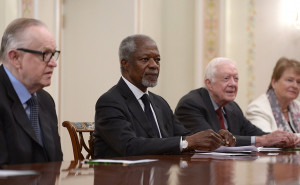
But who can bring about a change to the UN? Who are the international figures who could work with a new United Nations Secretary General to transform that body into one capable of interacting with countries pursuing participatory democracy?
The ready-made group that comes to mind is The Elders, founded in 2007 by Nelson Mandela and comprising a dozen independent, progressive world leaders committed to building peace and advancing human rights. The Elders work on solutions to global problems, from climate change to violent conflict, acting as “a fiercely independent and robust force for good, tackling complex and intractable issues – especially those that are not popular.”
After last year’s terrorist attacks in Paris, representatives of the world’s diverse religions gathered in Chicago and in London to show their unity, and in February of this year, Pope Francis embraced Russian Orthodox Patriarch Kyrill in Cuba. (Anyone remembering the Cuba nuclear crisis of 1962, will be struck by the symbolism of this encounter.)
Upon his return from his subsequent triumphal visit to the United States, the Pope alluded to Donald Trump, saying that someone who builds walls instead of bridges is not a Christian. Putting his hospitality where his mouth is, Frances has now invited Bernie Sanders to speak at a conference on social issues and the environment in Rome on the day after he debates Hillary Clinton in New York. One should put nothing past the Vatican’s latest tenant even if it has taken a millennium to reverse the tragic history of Christian-Muslim relations that began in the eleventh century with Pope Urban’s first crusades.
Francis is the most charismatic of current religious figures, with a much larger following than the equally media-savvy Dalai Lama. But Mandela’s Elders would undoubtedly also welcome the cooperation of Shia Iran’s Khatami, a Sunni reformation leader such as Tunisia’s Ghannouchi, a Jewish leader fighting for a two-state solution, and a Hindu leader. But such a cabal can only make a difference if it can recruit major political leaders to its cause – or, said differently, if major leaders reach out to them for support.
Whether it be Vladimir Putin railing about ‘the degenerate west’ or the world’s religious leaders, we are witnessing a new consensus in the making that not only takes on inequality, but also, the sacred cow of absolute freedom which includes the right to publicly denigrate a religion. I believe many western “progressives” would agree with Putin advisor Sergei Glaziev’s formulation:
“The role of religion in molding international politics will provide the moral and ideological basis for preventing ethnic conflicts…..Various religions can also be engaged in charting social policy, thus providing a moral framework for government decisions, restraining the permissiveness and laxity of the ruling elites in developed countries, and bringing back an understanding of authority’s social responsibility to society.
As the shaken values of the welfare state gain ideological support, political parties will have to acknowledge the importance of moral restrictions that protect the basic principles of human life. A social-conservative synthesis will lay the ideological groundwork for reforming international currency, financial, and economic relations based on fairness, mutual respect for national sovereignty, and mutually advantageous exchanges. This will require certain restrictions on market freedoms that discriminate against most people and countries by limiting their access to wealth.”
Participatory democratic regimes will be less likely to engage in wars of aggression that seek to transform traditional societies for the economic benefit of the 1%, profoundly altering social mores. And the growing world-wide campaign for participatory democracy will have a better chance of succeeding if it can rely on a world body tailored to this type of national polity.This in turn would diminish the likelihood of terrorist groups arising. There are both pro-capitalist and left-leaning Muslims. However, both appear more interested in imposing their view of society than in challenging globalization.
The growing world-wide campaign for participatory democracy will have a better chance of succeeding if it can rely on a world body tailored to this type of national polity. Over the decades, there have been numerous proposals for reforming the UN, the latest of which were made by Kofi Annan, (currently a member of the Elders). However, they have focused exclusively on the nuts and bolts of what is essentially an oversight institution, because the one superpower, for whom ‘freedom’ means keeping government at arms’ length, is vehemently opposed to world government.
Thankfully, the maintenance of the UN as “the principal organization regulating international relations” is one of Russia’s top priorities, as an element in a multi-polar world. And this year’s ‘election’ of a new Secretary General provides a unique opportunity for that body to begin to move toward a larger role, voting international guidelines that favor the many over the few.
Deena Stryker is an international expert, author and journalist that has been at the forefront of international politics for over thirty years, exlusively for the online journal “New Eastern Outlook.”
